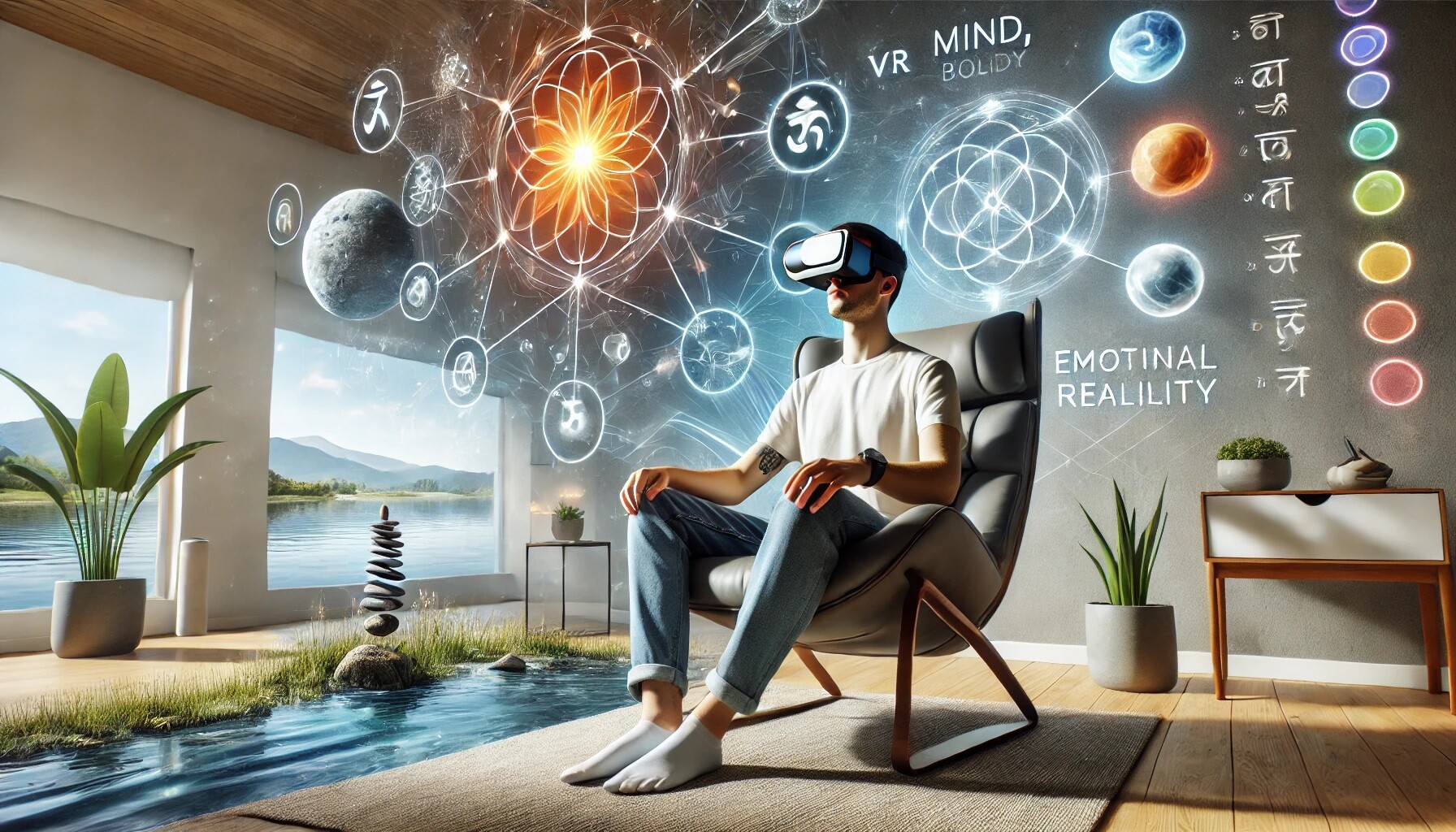The Benefits of VRenity: Enhancing Mental Wellness with 8D Sound and Virtual Reality
In a world where stress and anxiety have become all too common, finding innovative ways to support mental wellness is more important than ever. At ...
4 min read
 Nerdle
:
Jul 17, 2024 7:00:00 AM
Nerdle
:
Jul 17, 2024 7:00:00 AM

Empathy is the cornerstone of human connection, enabling individuals to understand and share the feelings of others. In today's technologically advanced world, immersive experiences—facilitated by virtual reality (VR), augmented reality (AR), and artificial intelligence (AI)—are transforming how we connect emotionally. These technologies can create profound, empathetic interactions that transcend physical boundaries. This blog explores the pivotal role AI plays in crafting these emotionally resonant, immersive experiences, with a particular focus on VRenity’s innovative approach to mental wellness through its VRenity Model.
Empathy is more than a buzzword in technology; it's a guiding principle. For years, the goal of technology has been to make tasks easier, faster, and more efficient. However, as our interactions with technology become more personal and pervasive, there's a growing need to make these interactions emotionally intelligent. AI has the potential to analyze and respond to human emotions, creating experiences that are not just immersive but also deeply empathetic. VRenity, for example, leverages this potential to boost mental wellness through its holistic approach, integrating mind, body, and emotional intelligence (EQ).
Immersive experiences have evolved dramatically over the past decade. From the early days of clunky VR headsets and basic AR overlays to today's sophisticated, high-fidelity simulations, the goal has always been to create a sense of presence and emotional engagement. AI has been at the forefront of this evolution, enhancing the realism and responsiveness of these experiences. By understanding and predicting user emotions, AI can tailor experiences in real-time, making them more engaging and meaningful. VRenity’s cutting-edge virtual environments exemplify this evolution, enhancing mental, physical, and emotional health in a comprehensive manner.
One of the most critical aspects of creating empathetic immersive experiences is understanding the user's emotions. AI systems equipped with emotion recognition capabilities can analyze facial expressions, voice tone, and even physiological signals to gauge how a user is feeling. This real-time emotional analysis allows the system to adapt the experience accordingly, enhancing the emotional connection. For instance, if a user appears stressed or anxious, the AI can introduce calming elements into the experience, fostering a sense of comfort and security. VRenity’s AI-powered life coach, Nerdle, exemplifies this approach by providing personalized meditation guidance tailored to the user’s emotional state.
Personalization is another crucial element in fostering empathy through immersive experiences. AI can create personalized narratives and interactions based on the user's preferences, history, and current emotional state. By tailoring content to the individual, AI makes the experience feel more relevant and engaging, strengthening the emotional bond. For example, in a VR therapy session, the AI can adjust the environment and dialogue to better suit the user's therapeutic needs, creating a more effective and empathetic experience. VRenity leverages this capability to enhance the user’s journey through its holistic wellness model, integrating mind, body, and EQ.
VRenity’s model is built on three essential pillars: mind, body, and EQ. This holistic approach ensures that users experience mental, physical, and emotional health benefits through immersive VR environments. By addressing these three aspects, VRenity creates a balanced and empathetic experience that promotes overall wellness. Users can engage in activities that stimulate the mind, rejuvenate the body, and enhance emotional intelligence, all within a seamless virtual environment.
Nerdle, VRenity’s AI-powered life coach and meditation guide, plays a crucial role in navigating users through their mental wellness journey. Utilizing advanced emotion recognition and personalized interaction techniques, Nerdle provides tailored meditation sessions and life coaching advice. This innovative approach ensures that users receive the support they need to manage stress, improve focus, and achieve a state of mental tranquility. Nerdle’s empathetic guidance helps users build resilience and emotional intelligence, contributing to their overall well-being.
Music has a profound impact on our emotions and mental state. VRenity Sound leverages this by offering an extensive library of music from up-and-coming artists, designed specifically for sound therapy. Whether users want to relax with soothing melodies or energize with upbeat tunes, VRenity Sound provides the perfect soundtrack to enhance their virtual journey. The integration of music therapy into VR experiences amplifies the emotional connection, creating a more immersive and empathetic environment.
In healthcare, AI-driven immersive experiences are proving to be powerful tools for therapy and rehabilitation. For instance, VR simulations are being used to treat PTSD, anxiety, and phobias. AI enhances these simulations by adjusting the intensity and nature of the scenarios based on the user's reactions, creating a safe and empathetic therapeutic environment. This personalized approach helps patients confront and manage their fears more effectively, demonstrating the potential of AI to create empathetic, healing experiences. VRenity’s integration of AI in its holistic wellness model showcases the potential of these technologies in promoting mental health.
In education and training, empathy is crucial for effective learning. AI-powered VR and AR platforms can create realistic scenarios that evoke emotional responses, helping learners develop critical skills such as empathy and emotional intelligence. For example, training programs for medical professionals often include AI-driven simulations where they interact with virtual patients. These simulations can mimic a wide range of emotional states and medical conditions, allowing trainees to practice their interpersonal skills in a controlled, yet emotionally rich environment. VRenity’s focus on EQ within its wellness model also highlights the importance of developing emotional intelligence in various fields.
While the potential of AI to create empathetic immersive experiences is immense, there are significant challenges and ethical considerations. Ensuring the privacy and security of users' emotional data is paramount. As AI systems collect and analyze sensitive emotional information, robust safeguards must be in place to prevent misuse and ensure user consent. Additionally, there is the risk of emotional manipulation. Designers must tread carefully to ensure that AI-driven experiences are genuinely empathetic and not exploitative. VRenity’s commitment to ethical standards and user privacy is essential in addressing these challenges.
Looking ahead, the future of empathy in immersive experiences is promising. Advances in AI, combined with improvements in VR and AR technology, will enable even more sophisticated and emotionally intelligent interactions. We can envision a future where AI-driven immersive experiences are an integral part of everyday life, helping us connect on a deeper emotional level with both technology and each other. Whether in healthcare, education, entertainment, or social interaction, the ability of AI to foster empathy will be a key factor in shaping these experiences. VRenity’s ongoing innovation in virtual reality and AI technology will continue to lead the way in enhancing mental, physical, and emotional well-being.
Empathy is a fundamental human trait that enriches our interactions and relationships. As AI continues to advance, its ability to recognize, understand, and respond to human emotions will play a crucial role in creating immersive experiences that are not just engaging but also deeply empathetic. By enhancing emotional connections, AI can transform how we experience and interact with the digital world, making technology a more compassionate and understanding companion in our lives. VRenity’s holistic wellness approach, innovative life coaching, and sound therapy exemplify how AI-driven immersive experiences can boost mental wellness and foster empathy, paving the way for a healthier, more emotionally connected future.

In a world where stress and anxiety have become all too common, finding innovative ways to support mental wellness is more important than ever. At ...

Employee wellness is a multifaceted concept that is rapidly evolving. As the workplace continues to change, driven by technology and new...